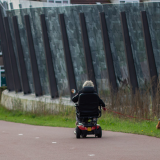Eurofound links its research to the policy priorities formulated by the European institutions and social partners. The Agency’s research findings show how policies are working out in practice, what approaches have been shown to work, and indicate how policies can be made more effective.
Living conditions and quality of life
Eurofound’s European Quality of Life Survey (EQLS) provides a fairly comprehensive picture of living conditions and helps depict new or emerging risks that can inform the social policies of the future. EQLS 2016, the fourth survey since 2003, looks at the situation around work and family life, health and care services, education, living standards, as well issues around social tensions and social inclusion.
Largely based on EQLS data, Eurofound produces a series of policy briefs from each survey on a range of topics providing background information and policy pointers for all actors and interested parties engaged in the current European debate on the future of social policy. Topics based on data from the EQLS 2016 include:
- What makes capital cities the best places to live?
- Is rural Europe being left behind?
- Age and quality of life: Who are the winners and losers?
- Social and employment situation of people with disabilities
- Social insecurities and resilience
- Social cohesion and well-being in the EU
EU PolicyWatch
Eurofound’s EU PolicyWatch database gathers together measures introduced by governments and social partners to respond to the social and economic effects of recent crises on businesses, workers and citizens. It includes policies in response to the COVID-19 pandemic, the war in Ukraine and the rise in inflation. It also includes policies supporting the digital and green transitions, as well as those to support companies and workers affected by restructuring.
Research on vulnerable groups
Other social policy research has examined a range of measures aimed at improving the situation of vulnerable groups. In particular, Eurofound has carried out extensive research on policies targeting young people, particularly those aged 15–29 who are not in employment, education or training (NEETs), long-term unemployed youth, as well as young people with disabilities or health problems. Research has also focused on issues affecting older people, including innovative solutions around income and retirement. Additional studies have looked at access to early childhood care, home-care services, and care homes for older Europeans. Research has also examined equal opportunities and social mobility in Europe and measures to promote employment opportunities for economically inactive persons, while evidence on in-work poverty has been assessed.




























